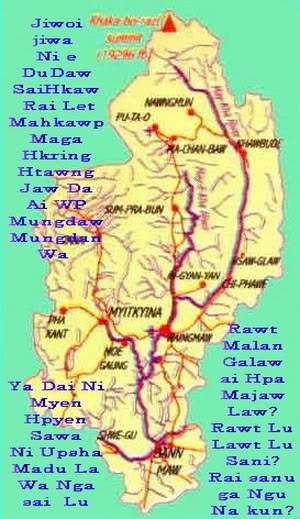By MITCH MOXLEY / IPS WRITER
BEIJING — When the military regime in Burma launched a campaign last August to disarm the ethnic rebels in the Kokang region, made up mostly of ethnic Chinese and where a two-decade long cease-fire had been in place, the push triggered an exodus of more than 37,000 refugees into China’s Yunnan Province.
The move, which frustrated the Chinese government in Beijing, sheds light on brewing troubles in China-Burma relations. China has a significant interest in a stable Burma and a greater influence over the xenophobic regime than perhaps any other power. But as an election approaches in Burma (officially known as Myanmar) that the ruling generals dubiously claim will be free and fair, China-Burma relations are growing increasingly strained.
Complicating matters is growing anxiety that another push against armed ethnics groups in eastern Burma will cause a second refugee crisis in southern China’s Yunnan province, which borders the military-ruled Southeast Asian state along with Laos and Vietnam. Observers say the junta is preparing for a military campaign against the 30,000-strong United Wa State Army, which is ethnically Chinese and has been accused by the United States of being a drug cartel.
"What’s happening on the border brings into sharp relief the fault lines in [China-Burma relations] that have been apparent for some time but are now more clearly defined," said Dr. Ian Storey, a fellow at the Institute of Southeast Asian Studies in Singapore.
"This is not a relationship that is based on trust and mutual friendship. It’s very much a marriage of convenience."
In Burma, distrust of China runs deep, and the junta has for several years tried to reduce its dependence on the latter by courting other nations, namely, India and Russia. China, meanwhile, has grown frustrated with Burma’s lack of progress on political reform and addressing economic disparities, Dr Storey said.
Burma was one of the first countries to recognize the People’s Republic of China in 1949, but relations turned for the worse in the 1960s, culminating in anti-Chinese riots in the then-capital, Rangoon (now known as Yangon). But when Western countries imposed broad sanctions on Burma following a crackdown on pro-democracy protesters in 1988, China upped aid and arms shipments and fostered trade relations.
Since then, China has provided broad diplomatic and economic support for the junta, considered one of the most corrupt in the world. According to state media, China is Burma’s fourth largest foreign investor and has invested more than US$ 1 billion in the country, mostly in the mining sector. In 2008, bilateral trade grew more than one-quarter to about $ 2.63 billion.
In October 2009, state-owned China National Petroleum Corporation started building a crude oil port in Burma, part of a pipeline that will carry 12 million metric tons of crude oil a year from the Middle East and Africa through Burma into China, roughly 6 percent of China’s total imports last year. Another pipeline, slated to come online in 2012, will have a capacity to bring in 12 million cubic metres of gas from Burma into China.
Burma gives China access to the Indian Ocean through its ports, not just for oil and gas import and export to China’s landlocked southwest, but also for potential military bases.
The generals, meanwhile, depend on China for money and armaments. In 2006, during a visit to Yunnan, Burma’s Commerce Minister Tin Naing Thein thanked Beijing for being a "good neighbor" and offering "vigorous support" following the 1988 crackdown on pro-democracy protestors. China also offers Burma some protection within the United Nations Security Council.
"Burma is isolated from the international community, and the Association of Southeast Asian Nations (Asean) has put a lot of pressure on Burma to improve its human rights conditions," said Yu Changsen, an associate professor in the International Affairs Department of Sun Yat-Sen University, located in Guandong Province. "Burma depends on China in many aspects… [The relationship] is somewhat like that of China and North Korea."
Despite appearances, relations in recent years have been increasingly troubled. For many years, China backed Burmese communists in their armed struggle with the government, and many of Burma’s current leaders once fought against the communists. Today, many Burmese view China as a pillager of resources.
Huang Yunjing, an associate professor at Sun Yat-Sen University’s Asia- Pacific Research Institute, said that the schisms in China-Burma relations are overblown, noting that China’s investments in its military-ruled neighbor continue to grow. "China and Burma share many common interests in political, economic and security aspects," he said.
May 21, 2010
Subscribe to:
Post Comments (Atom)
WUNPAWNG MUNGDAN SHANGLAWT HPUNG A NINGGAWN MUNGMASA
WUNPAWNG MUNGDAN SHANGLAWT HPUNG A NINGGAWN MUNGMASA
CHYE JU KABA SAI
Sa Du N'Gun Jaw La ai Majaw N'chying wa Chyeju Dum Ga ai,Yawng a Ntsa Wa Karai Kasang Kaw na N'Htum N'Wai ai Shaman Chye ju Tut e Hkam La Lu Nga mu Ga law







No comments:
Post a Comment